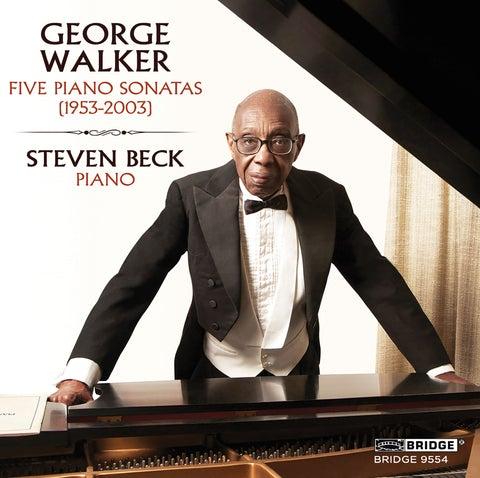
As the first African American composer to win a Pulitzer Prize, George Walker (1922–2018) received an affirmation long overdue. By the time of the award — for Lilacs, a work for voice and orchestra, in 1996 — he had produced a considerable body of work in multiple genres and styles while remaining largely below most listeners’ radar. A 2015 appreciation in The Guardian bore the headline, “George Walker: the great American composer you’ve never heard of.”
While Walker occasionally referenced spirituals and jazz, he was wary of being pigeonholed. The “common denominator [of Black composers of his generation],” he wrote in a 1991 essay, was “not a use of black idioms but a fascination with sound and color, with intensities and the fabric of construction.”

An accomplished pianist and organist, Walker had long-standing affinity for the keyboard. A fine new Bridge label recording of Walker’s five piano sonatas, composed over a 50-year span, affirms it. Even as he migrated from the manner of Copland and Barber into atonality and serialism, Walker exhibited a bounty of melodic invention, quicksilver figurations, percolating rhythms and harmonic complexities. Underpinning it all was a structural rigor that organized his musical thoughts without straitjacketing them.
Performed with clarity and conviction by Steven Beck, the collection opens with the longest work, the 1953 Sonata No. 1. The first movement, marked Allegro energetico, introduces the composer’s distinctive flair for mining his material. A discursive yet absorbing theme is worked out in a cascading development. A brief lyrical interlude is swept away by another propulsive burst leading to a rhythmically charged climax.
In the wittily compressed second movement, Walker spins out a series of contrasting variations on a simple yet elegant folk tune. At once cryptic and incisive, the variations, some mere seconds long, range from the wispy to the percussively urgent to the patiently languid. In one fine effect, the left and right hands seem to engage in a call-and-response. This excellent work concludes with another expansive Allegro that revives material from the first movement, enriching it with deft contrapuntal maneuvers and translucent sonorities.
The Sonata No. 2 gets underway with another set of variations, here less clearly delineated. Walker’s fondness for restless, furled arpeggios is in evidence. A furtive little Presto enlivened by Stravsinkian accents sets up the somber gravity of the Adagio that follows.

Beck’s sensitive, focused performance elicits the shimmering density of the chords and lacey figuration that spans the keyboard. Beethoven is lurking somewhere in the final movement, which features one of Walker’s characteristically arresting final measure. Again and again, he ends his movements with surprising gestures, sometimes assertive but often tersely enigmatic.
Two decades separate the second sonata from the third, which debuted in 1975 and was revised in 1996. Walker had embraced atonality by then, though not in any stiffly regimented way. The Sonata No. 3 works its way toward a beguiling series of pedal-sustained chords that bring Scriabin-like colors to mind. The middle movement, “Bells,” consists entirely of a single chord chimed over and over across rising and dying dynamics, as if the listener were approaching and passing a tower. In a closing Choral and Fughetta, Walker weaves his spare yet spidery melodies across a well-made (and well-disguised) grid.
The two-movement Sonata No. 4 (1984) and the single-movement Sonata No. 5 (1996) reprise many of Walker’s virtues and some of his liabilities. The lustrous opening of the fourth sonata and some haunting responses to it turn somewhat scattered and diffuse later on. At under five-minutes the final sonata tries too hard to justify its brevity.
Beck makes a persuasive case for the music throughout. From his crisp but never dry phrasing to the cloudburst chords and wittily clipped endings, the pianist does his best to enhance this ingratiating, too-little-known composer’s reputation.








